
One of my favorite recreations is what I call urban hiking. I love few things more than to put on a good pair of shoes and take off to walk my city. The best days are the ones during which I walk all day, 8-9 hours, non-stop, covering 15-20 miles.
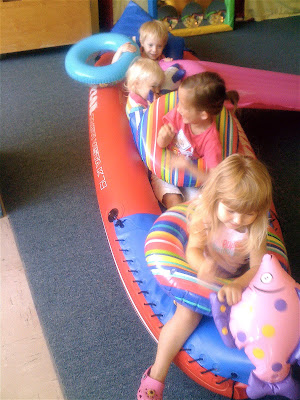
I think of it as a kind of walk-about. I sometimes start off with my music in my ears, but usually turn it off after the first hour. I'm seeking the experience of solitude, I suppose, and the ordeal of trudging for hours on end is the way I get there. To say I "enjoy" it would be inaccurate, because I don't always like what I'm doing. I often curse myself for biting off more than I can chew, I worry about the blister I feel forming on my heel, I carry on aggravating, often argumentative imaginary conversations with the people in my life. But, after a time, if I just keep putting one foot in front of the other, my entire world becomes about simply putting one foot in front of the other, step over step, step over step, moving forward until I achieve a kind of meditative state in which even my internal chatter disappears and all I'm left with is the putting of one foot in front of the other.
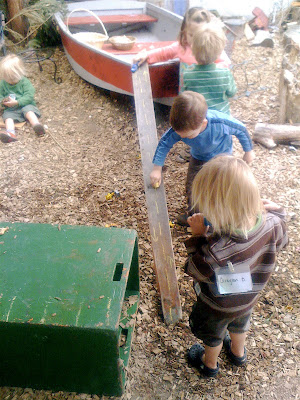
I'm usually underway without a destination in mind until the final hour or two. That's when I start homing in on a location with two important features: good food and easy access to mass transit. I'm particularly fond of bellying up to the noisy bar in a place with a well-reputed kitchen, sweaty, dusty, and tired, starting with water, then a beer, then an appetizer, then a salad, then a massive gut-busting entree. I gradually re-enter the society of other humans by exchanging words with the bartender or the strangers sitting beside me, connecting with them in snippets. By the time I've finished a second beer and dessert, I'm ready to totter off to the bus stop and head home to my family.
These are special times for me because most of my life as a husband, father, and teacher is about being deeply engaged with the other people, responding to them, listening, steering, persuading, being persuaded, the stuff of which a good life is made.
I'm not the only one out there walking. There's another guy, in particular, who I often encounter on my walks. He appears to be one of the many homeless men who wander anonymously about our city. He wears several layers of dirty clothing, including a parka, even on the hottest days. He carries a duffle bag, which he occasionally shifts from one shoulder to the other. He walks, as I do once I've achieved my meditative state, with his eyes on the ground a few feet in front of him, the bill of his dusty LA Dodgers cap keeping his face in shadow, although I've peeked under there to see a handsome, bearded face with pale blue eyes. He could be a man aged anywhere from 40 to 70. In my mind, I've named him "The Walking Man."
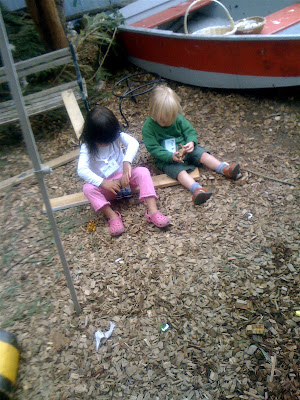
I don't only see him when I'm on my urban hikes. I've often come across him in the
my own Pandora (Seward Park) as I exercise the dog. And I've passed him in the car as far away as Madison Park, 10 miles north of there. As near as I can tell, he spends his days, every day, slow-marching his way up and down the shores of Lake Washington, not looking left or right, just walking. I've tried saying, "Hi," but since it seems to make him wince, I've tempered my friendliness to just nodding and smiling. He does respond a bit to the dog, moving to the edge of the wooded paths when we encounter him in what I can only see as a touching act of self-preservation. Was he bitten by a dog as a child? Was he born with a fear of dogs?

I ask myself these kinds of questions about him. I wonder about him as a child. Did he play with the other children or was he isolated even then? Were there great tragedies in his life that shut him down or is he the victim of untreated mental illness exacerbated by simple neglect? If there ever were people who cared about him, have they died or abandoned him? Or are there people, even now, who love him, worry about him, people who are seeking him out?
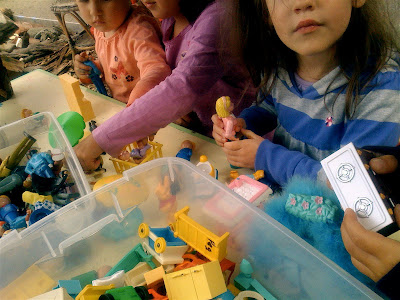
In one sense, of course, we are all alone in this world, and while we each must discover our own way to deal with that great and terrifying truth, most of us, most of the time, find that connecting with one another in love and common cause is the only healthy way to go. As much as I want to find a spiritual or philosophical rationale for why The Walking Man is engaged in a valid response to the great and terrifying truth, he is not. Somewhere along the way he was betrayed by the rest of us humans. Either we shut him down through abuse or neglect, or we never gave him the opportunity to learn the social and interpersonal skills we all need in order to not be alone. Without that, I can understand why he just keeps moving, putting one foot in front of the other, fixing his eyes on the ground before him and nothing else. To look up, even for a moment, is to contemplate an abyss, something none of us can do for very long without going insane.
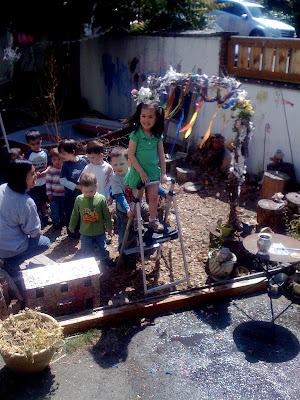
Motivation, sociability, the ability to work with others: these are, after all, the only things worth teaching our young children. Friendliness, courtesy, appropriately processing emotions, gentleness, laughter, eye contact, smiling, curiosity: these are the skills that we all need in order to connect with the other people.
Of course, we all need to be alone as well, to recharge, reassess, renew, but without the prospect of a humans at the other end, we become The Walking Man.
We sing a song at school called "When Sammy Put The Paper On The Wall." Near the end we all come together in one of those hot-breathed, germ-sharing group hugs singing, "We're all stuck together." I slow the song down at that point, sometimes even repeating the line again, holding the note, giving us a chance to experience all of our bodies clutched together like that, vibrating with the only answer to the meaning of life that makes any sense, large and small, boys and girls, introverts and extroverts.
We then separate to the line, "Like birds of a feather," flapping our wings, and then finish big, "Since Sammy put the paper on the waaaaaaaalllllll!"
Not long ago, one of the children, said after we finished, "Let's do a caterpillar hug!" I'd never heard that expression before, although it immediately conjured an image in my mind. Apparently, I wasn't the only one. We adults did our usual adult thing of trying to help organize them, but we were really superfluous. The children lined themselves up, one behind the other, wrapping their arms around the waist of the child in front while also being embraced from behind, all stuck together, a giggling, squirming chain of humans.





